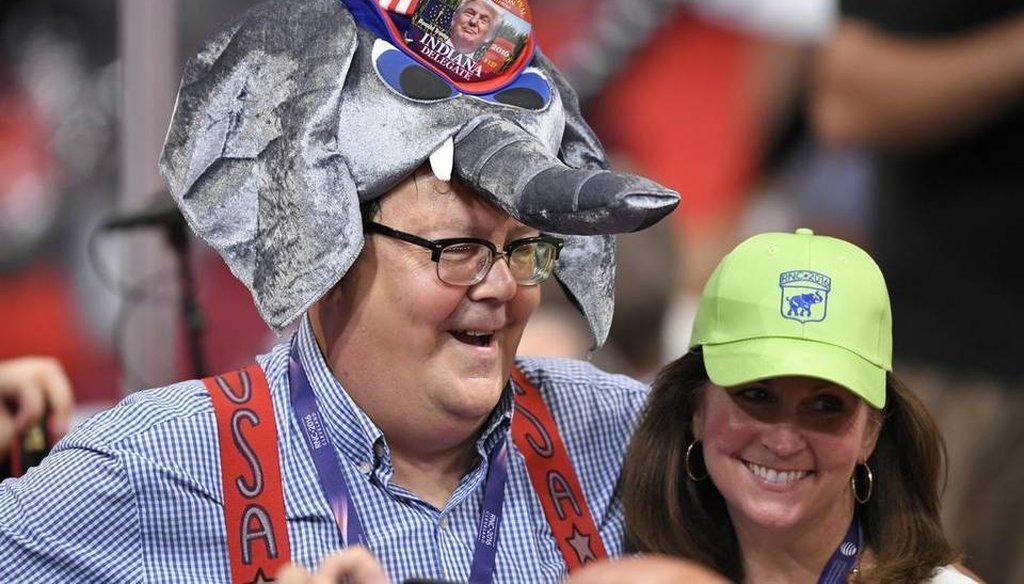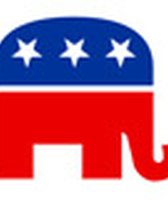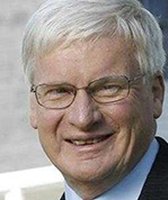Get PolitiFact in your inbox.

A delegate at the Republican National Convention
Mayor Johnson overestimates economic benefit of hosting RNC
If Your Time is short
-
The $200 million estimate was based on numbers from the 2016 Republican National Convention hosted in Cleveland.
-
One expert notes that the estimate is "certainly wildly exaggerated."
- A comprehensive study looking into the economic impact of multiple previous political national conventions suggests that hotel revenues, for instance, increased by $20 million on average for the host cities.
Editor's Note: Since this item was first published, VISIT Milwaukee reduced its estimate for hotel revenue from the RNC. The change is reflected in the text.
In 2020, before the pandemic upended plans, the fact the Democratic National Convention was coming to Milwaukee was widely cheered. Now, with a decision looming on whether the city will get to host the 2024 Republican National Convention, views are more mixed.
Liberal groups from across the state have called on city officials to reject the convention, citing Republicans who continue to question the results of the 2020 presidential election and a range of other criticisms. But the Milwaukee Common Council ultimately endorsed an agreement with the Republican National Committee, which is to decide between Milwaukee and Nashville in the coming weeks.
Various city officials, including Mayor Cavalier Johnson, have boasted of the benefits of holding the convention – including one boast that we found goes too far.
During a May 27, 2022 news conference, Johnson said that the RNC is "a $200 million economic infusion into our communities."
Let’s dig in.
Estimates based on 2016 RNC in Cleveland
The $200 million number was based on estimates from the city’s tourism bureau, VISIT Milwaukee, according to a Johnson spokesperson. The estimate, in turn, was based on a study by Cleveland State University on the economic impact of the 2016 RNC in Cleveland.
So why use the 2016 RNC as a basis?
VISIT Milwaukee used the study for a number of reasons, including that it’s the most recent non-pandemic political convention. What’s more, Milwaukee has a similar population and geography to Cleveland, said Peggy Williams-Smith, president and CEO of VISIT Milwaukee.
"We’re confident that this convention will have not only a short-term economic boost, especially for our hospitality businesses, but will lead to more and larger meetings in the long run," Williams-Smith said.
She noted that Cleveland officials believe the 2016 RNC played a role in securing the NBA and Major League Baseball all-star games.
Williams-Smith believes that hotel nights alone could generate $32 million (the convention is expected to draw about 45,000 people and will have to secure at least 16,000 rooms for state delegations) and other parts of the hospitality industry will benefit. Note: (After this item was published, VISIT Milwaukee reduced its estimate of revenue from hotels to $23.2 million.
"It should not be forgotten that one amazing part about Milwaukee is how many of our restaurants are locally owned and totally unique to our city," she told PolitiFact Wisconsin. "Many of them will benefit just as the hotels will."
Stretched projections? Very likely.
Let’s look more closely at the Cleveland study, which was completed by a four-person team at Cleveland State University’s Center for Economic Development.
The Cleveland study examined the RNC’s economic impact through spending by the RNC Host Committee, spending by the city of Cleveland, and visitor spending.
The total labor income tied to Cleveland hosting the RNC reached $52.4 million and the value-added impact was $84.8 million — bringing the total impact to $142.2 million, according to the study. The RNC was responsible for $16.9 million in taxes (that’s 30% in state and local taxes and 70% in federal taxes).
All in all, the overall economic impact of Cleveland hosting the RNC in 2016 included 855 direct jobs, $27.6 million in labor income and supported 1,348 total jobs.
So, does that make the $200 million estimate from VISIT Milwaukee correct?
One academic who has studied the fiscal impact of national political conventions says the estimate is likely far higher than the actual impact will be, especially when you look at how the local economy will benefit.
Victor Matheson, an economics professor at the College of the Holy Cross in Worcester, Massachusetts, along with two co-authors carried out an extensive peer-reviewed study that analyzed the economic impact on cities who have hosted the Republican and Democratic national conventions from 1970 to 2004.
The study carried out by Matheson and other academics discerned that there were no "significant wage gains for local employees" and that the "economic gain from the event does not accrue to the host city but rather benefits the bottom line back at corporate headquarters."
The report found the presence of the Republican or Democratic convention had "no discernible impact on employment, personal income, or personal income per capita in the cities." It also noted that many studies exaggerate the "multiplier" effect of money spent in the community, which is meant to approximate how often it changes hands.
For instance, money paid to a hotel goes products from local companies and goes to pay staff members, who in turn spend it on gas, food and even their own entertainment.
When looking at just the hotel revenue, Matheson told us the study found revenue increased by $20 million on average.
"It's pretty hard to get from $20 million of hotel revenue, up to $200 million in total economic activity," he said, adding: "Even if you could get $200 million worth of expenditures, it certainly wouldn't be $200 million of money that winds up in the pockets of local Milwaukee residents."
For a convention, much of the money will quickly leave the community, he said, providing these examples among others:
- Conventions typically bring in police officers from other cities to augment their own and be paid for it.
- Stockholders in big national hotel chains and car rental services will reap profits.
- Uber drivers who may come up from Chicago or other cities to take advantage of surge pricing.
"I think it's almost certainly wildly exaggerated," Matheson said.
Our ruling
Johnson claimed the RNC is "a $200 million economic infusion into our communities."
While the figure from VISIT Milwaukee is grounded in the experience of Cleveland in 2016, an expert who has studied a range of past conventions say it is "wildly exaggerated." What’s more, even if anticipated spending figures were reached, much of the money would quickly leave the local economy for other places.
We rate the claim Half True.
Our Sources
Milwaukee Journal Sentinel, Milwaukee Mayor Cavalier Johnson says requiring a payment for the RNC to come to the city is a 'nonstarter' for him, May 27, 2022.
Milwaukee Journal Sentinel, Liberal groups call on Milwaukee leaders to reject 2024 Republican National Convention, May 24, 2022.
Recording of Mayor Cavalier Johnson’s speech in Milwaukee on May 27, 2022.
Statement from Peggy Williams-Smith.
Interview with Claire Koenig, spokesperson for VISIT Milwaukee.
Cleveland State University, The Economic Impact of the 2016 Republican National Convention, April 2017.
Interview with Victor Matheson.
College of the Holy Cross, Rejecting ‘‘Conventional’’ Wisdom: Estimating the Economic Impact of National Political Conventions, 2009.
College of the Holy Cross, Unconventional Wisdom: Estimating the Economic Impact of the Democratic and Republican National Political Conventions, May 2017.
Emails with Jeff Flemming, Mayor Cavalier Johnson’s spokesperson.
Browse the Truth-O-Meter
More by Vanessa Swales
Mayor Johnson overestimates economic benefit of hosting RNC
Support independent fact-checking.
Become a member!
In a world of wild talk and fake news, help us stand up for the facts.

























































